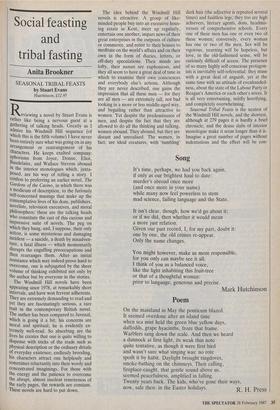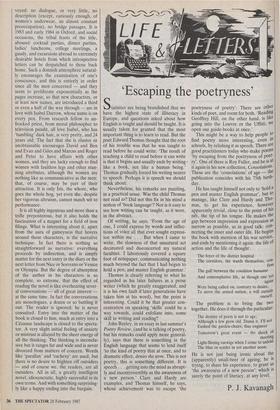Social feasting and tribal fasting
Anita Brookner
SEASONAL TRIBAL FEASTS Reviewing a novel by Stuart Evans is rather like being a nervous guest at a gathering of talking heads. Greatly as I admire his Windmill Hill sequence (of which this is the fifth volume) I have never been entirely sure what was going on in any arrangement or rearrangement of his characters. He keeps exalted company: aphorisms from Joyce, Donne, Eliot, Baudelaire, and Wallace Stevens abound in the interior monologues which, juxta- posed, are his way of telling a story. I confess to preferring an earlier novel, The Gardens of the Casino, in which there was a modicum of description, to the furiously self-concerned musings that make up the contemplative lives of his dons, publishers, novelists, television executives, and moral philosophers: these are the talking heads Who constitute the cast of this curious and impressive suite of novels. The peg on which they hang, and, I suppose, their only action, is some mysterious and damaging Incident — a suicide, a death by misadven- ture, a fatal illness — which momentarily disrupts the engulfing preoccupations and then rearranges them. After an initial resistance which may indeed prove hard to overcome, one is subjugated by the sheer volume of thinking exhibited not only by the author but by everyone in the stories.
The Windmill Hill novels have been appearing since 1978, at remarkably short Intervals, and have won fervent adherents. They are extremely demanding to read and yet they are fascinatingly serious, a rare trait in the contemporary British novel. The author has been compared to Juvenal, which is going it a bit; his concerns are moral and spiritual; he is evidently ex- tremely well-read. So absorbing are the lives he creates that one is quite willing to dispense with tricks of the trade such as physical description or the ordinary details of everyday existence; endlessly brooding, his characters attract one helplessly and sometimes reluctantly into their wordy and concentrated imaginings. For those with the energy and the patience to overcome the abrupt, almost insolent remoteness of the early pages, the rewards are constant. These novels are hard to put down. The idea behind the Windmill Hill novels is attractive. A group of like- minded people buy into an executive hous- ing estate in Kent, meet up regularly, entertain one another, impart news of their great enterprises in the outposts of culture or commerce, and retire to their houses to meditate on the world's affairs and on their own in the form of diaries, letters, or off-duty speculations. Their minds are lofty, their names are euphonious, and they all seem to have a great deal of time in which to examine their own consciences and everybody else's actions. Although they are never described, one gains the impression that all these men — for they are all men — are extremely tall, not bad looking in a more or less middle-aged way, and beguiling rather than attractive to women. Yet despite the predominance of men, and despite the fact that they are allowed to do all the thinking and talking, women abound. They abound, but they are distant and unrealised. The women, in fact, are ideal creatures, with 'tumbling' dark hair (the adjective is repeated several times) and faultless legs; they too are high achievers, literary agents, dons, headmis- tresses of comprehensive schools. Every one of these men has one or even two of these women; conversely, every woman has one or two of the men. Sex will be vigorous, yearning will be hopeless, but love, in the old-fashioned sense, will be curiously difficult of access. The presence of so many highly self-conscious protagon- ists is inevitably self-referential: they muse with a great deal of anguish, yet at the same time with an attitude of evenhanded- ness, about the state of the Labour Party or Reagan's America or each other's wives. It is all very entertaining, mildly horrifying, and completely overwhelming. Seasonal Tribal Feasts is the neatest of the Windmill Hill novels, and the shortest, although at 279 pages it is hardly a brief chronicle, and the dense slabs of interior monologue make it seem longer than it is. Imagine a great number of pages without indentations and the effect will be con- veyed: no dialogue, or very little, no description (except, curiously enough, of women's underwear, an almost constant preoccupation), no bridge passages. It is 1983 and early 1984 in Oxford, and social occasions, the tribal feasts of the title, abound: cocktail parties, dinner parties, ladies' luncheons, college meetings, a gaudy, and excursions abroad to extremely desirable hotels from which introspective letters can be despatched to those back home. Such a donnish atmosphere natural- ly encourages the examination of one's conscience, and this is entirely in order since all the men concerned — and they seem to proliferate exponentially as the pages increase, so that new characters, or at least new names, are introduced a third or even a half of the way through — are in love with Isabel Darrow, whose name is on every pen. From research fellow to un- frocked priest, from moral philosopher to television pundit, all love Isabel, who has `tumbling' dark hair, is very pretty, and 24 years old. The fact that she is elusive or unobtainable encourages David and Ben and Evan and Giles and Marcus and Roger and Peter to have affairs with other women, and they are lucky enough to find women with faultless legs and other stun- ning attributes, although the women are nothing like as communicative as the men: that, of course, may be part of their attraction. It is only Iris, the whore, who goes the whole hog, yet even she, despite her vigorous altruism, cannot match wit to performance.
It is all highly ingenious and more than a trifle preposterous, but it also holds the fascination of a magnet for a field of iron filings. What is interesting about it, apart from the aura of gameyness that hovers around these characters, is the narrative technique. In fact there is nothing so straightforward as narrative: everything proceeds by indirection, and is simply matter for the next entry in the diary or the next letter from Nice or Sorrento or Venice or Olympia. But the degree of absorption of the author in his characters is so complete, so extreme, that the effect of reading the novel is like overhearing sever- al conversations — all of great interest at the same time. In fact the conversations are monologues, a dozen or so battling it out. The reader is ignored: he is never consulted. Entry into the matter of the book is closed to him, much as entry into a Cezanne landscape is closed to the specta- tor. A very slight initial feeling of anxiety or mistrust is allayed by the sheer energy of all the thinking. The thinking is inconclu- sive but it ranges far and wide and is never divorced from matters of concern. Words like 'parallax' and `cachexy' are used, but there is no desire to frighten off outsiders and of course we, the readers, are all outsiders. All in all, a greatly intelligent novel, idiosyncratic, highly successful in its own terms. And with something surprising- ly like a happy ending into the bargain.



















































 Previous page
Previous page